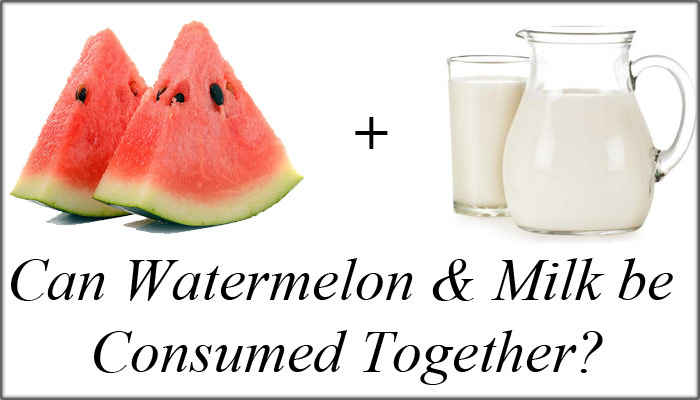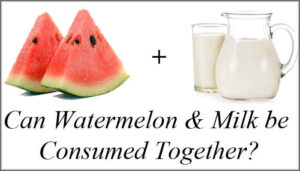Watermelon and milk are both well-known for their nutritional benefits. Learn about the vitamins and minerals that each of these foods provides along with their impact on your overall health.
Eating watermelon and drinking milk are both great ways to give your body key vitamins, minerals, and other essential nutrients that can help keep you healthy. Discover the benefits of consuming these two popular foods and learn how they can help your body function at its best.
Milk is loaded with essential nutrients that help build strong bones and muscles. It also contains protein, which can help improve muscle strength and repair. Additionally, milk is a source of calcium, an important mineral for developing healthy teeth and bones. Other beneficial vitamins found in milk include Vitamin D and B Vitamins – both of which are crucial for improving overall health.
What Do Watermelon and Milk Do To The Body?
This combination may cause discomfort and result in higher gas output than usual. As a result, it is advised to avoid drinking milk after eating watermelon.
Watermelon has diuretic properties. Consume too much of it, and…well, you know. If you’re lactose sensitive, drinking milk after eating watermelon may aggravate the condition.
Perhaps nothing will happen. Everyone reacts differently to the foods. However, keep in mind that this dietary combination may be difficult for your body. Why?
Watermelon is a delightful fruit that is abundant in vitamins A and C, potassium, magnesium, and includes simple carbohydrates that do not require digestion and hence do not linger in the stomach for long.
Watermelon also contains a variety of other beneficial nutrients, such as the amino acid citrulline. Citrulline is best recognized in the sporting world as a non-essential amino acid that aids athletes in improving their performance (The “secret” ingredient of watermelon that helps give you stronger muscles).
Milk is high in both fat and protein. So, if you eat watermelon after drinking milk, the acids in the watermelon can attach to the high amount of protein in the milk, curdling it and causing it to stay in the stomach for too long and ferment.
Your stomach will contain both milk and watermelon. We did this as kids all the time with no consequences.
How does Watermelon benefit your overall health?
Watermelon is packed with a variety of vitamins and minerals, such as vitamins A, B6, C, and potassium. Besides its reputation of being high in antioxidants, watermelon also contains lycopene an antioxidant that supports heart health and helps protect skin from sun damage. Additionally, the presence of Vitamin C in watermelon can boost the immune system and help maintain healthy bones.
Therefore, this common summer snack is good for both physical and mental wellness.
Watermelon is low in calories and packed with essential vitamins and minerals. It is a good source of lycopene, a powerful antioxidant that helps protect cells from damage and plays an important role in skin health. Eating watermelon can also help keep your heart healthy, promote digestive health, reduce inflammation, and boost hydration.
ALSO SEE: Dr. Rashel Face Cream Review
What essential nutrients does Milk provide?
Milk is a rich source of essential nutrients, including:
Calcium: Milk is an excellent source of calcium, providing about 300 mg per cup. Calcium is a mineral that plays a crucial role in the development and maintenance of strong bones and teeth. It is necessary for the proper functioning of muscles and nerves, and also plays a role in blood clotting and the regulation of heart function.
Adequate intake of calcium is especially important during childhood and adolescence when bones are still developing, as well as in older adults when bone loss becomes a concern. Consuming a diet that includes adequate amounts of calcium-rich foods, such as milk and other dairy products, leafy green vegetables, nuts, and fortified foods, can help ensure that the body gets the calcium it needs to maintain strong bones and overall health.
Vitamin D: Milk is often fortified with vitamin D, which helps the body absorb calcium. Vitamin D is a fat-soluble vitamin that helps the body absorb and use calcium and phosphorus, two minerals that are essential for strong bones and teeth. When there is not enough vitamin D in the body, the body cannot absorb enough calcium, which can lead to weak bones, a condition known as rickets.
Vitamin D can be found in a few foods such as fatty fish, egg yolks, and mushrooms, but it is difficult to obtain enough from food alone.
That’s why milk and other dairy products, as well as breakfast cereals and some brands of orange juice, are fortified with vitamin D. The recommended daily intake for adults is 600-800 IU/day. Getting enough Vitamin D through diet or supplements can help support bone health and overall health.
Vitamin B12: Milk is a good source of vitamin B12, which is an essential nutrient that plays a crucial role in the formation of red blood cells and the proper functioning of the nervous system. Vitamin B12 is also necessary for the synthesis of DNA, the genetic material in all cells, and it helps to make the protective sheath that surrounds nerve cells. It can be found mainly in animal-derived foods such as dairy products, eggs, meat, fish, and poultry. A deficiency in vitamin B12 can cause a variety of health problems such as anemia, fatigue, and nerve damage.
The recommended daily intake for adults is 2.4 mcg/day. Consuming a diet that includes adequate amounts of vitamin B12-rich foods, such as milk and other dairy products, meat, fish, and eggs, can help ensure that the body gets the vitamin B12 it needs to maintain healthy red blood cells and a properly functioning nervous system.
Protein: Milk is a good source of high-quality protein, which is essential for the growth and repair of body tissues. Protein is made up of smaller building blocks called amino acids, which are necessary for the production of enzymes, hormones, and other important molecules in the body. Protein also plays a role in the immune system, helping to protect the body from infections and other diseases.
Adequate intake of protein is especially important for children and adolescents, as well as for people who are trying to build or maintain muscle mass. Milk contains two types of high-quality protein: casein and whey protein. Casein, which makes up about 80% of the protein in milk, is a slow-digesting protein that can help to keep you feeling full and satisfied for longer. Whey protein, which makes up the remaining 20% of the protein in milk, is a fast-digesting protein that is easily absorbed by the body, making it a great option to consume after exercise.
The recommended daily intake of protein is 46 g/day for women and 56 g/day for men. Consuming a diet that includes adequate amounts of protein-rich foods, such as milk and other dairy products, meat, fish, eggs, and legumes, can help ensure that the body gets the protein it needs to maintain healthy tissues.
Potassium: Milk contains potassium, which helps regulate blood pressure and supports healthy muscle and nerve function.
Phosphorus: Milk contains phosphorus which helps build strong bones and teeth and supports the body’s metabolism.
Vitamin A: Milk is a good source of vitamin A, which supports eye health and helps keep skin and the immune system healthy.
Vitamin B2 (Riboflavin): Milk is a good source of Vitamin B2, which helps to convert food into energy and is essential for healthy skin, eyes, and the nervous system.
It’s worth mentioning that the nutrient levels in Milk may vary based on the type of milk, for example, Whole milk has more fat content than Skimmed Milk.
What are the vitamins and minerals in Watermelon?
Watermelon contains nutrients such as vitamins A and C, potassium, amino acids, antioxidants, and dietary fiber. Vitamin A contributes to healthy eyesight while vitamin C helps maintain a strong immune system. Potassium helps support heart health while the amino acids and antioxidants in watermelon are essential for cell health. Lastly, the dietary fiber in watermelon assists in digestion.
Watermelon and milk have some essential nutrients in common. Both these foods are great sources of Vitamin C, an antioxidant that helps fight inflammation and promote healthy skin. They also contain Potassium, an important mineral that helps regulate heart rate and blood pressure. Additionally, both watermelon and milk are rich in dietary fiber which helps keep your digestive system healthy and regular.
Harmful Effects of Watermelon and Milk on Your Gut When Mixed Together
It is not recommended to consume watermelon and milk together as they can cause digestive issues such as bloating, gas, and diarrhea.
This is because the combination of these two foods can create an imbalance in the digestive system and lead to fermentation in the gut.
Additionally, the high levels of lactose in milk can cause difficulty in digestion for those who are lactose intolerant. It is best to consume these foods separately.





